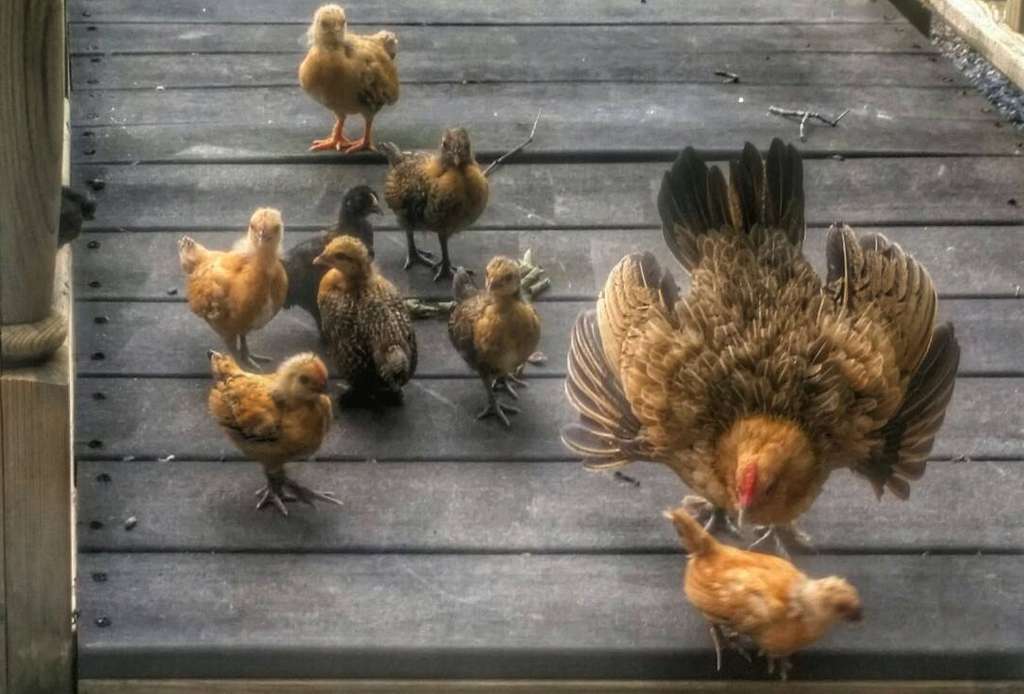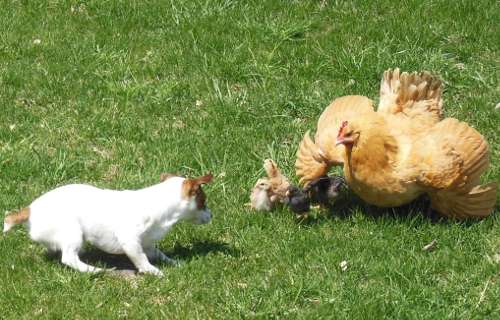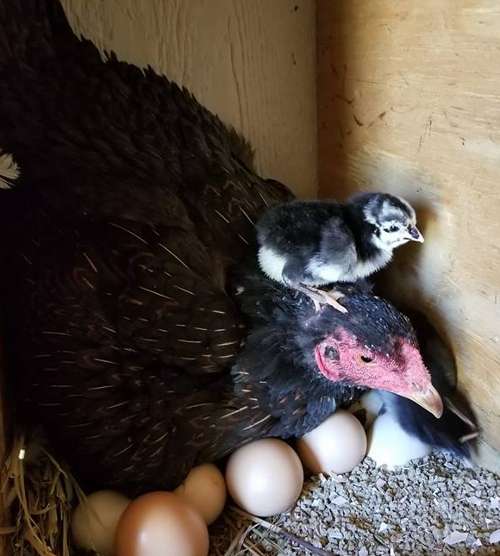Are hens protective of their chicks?

Mother hens are very protective of their chicks. They keep them close with a series of special clucks and warn them of any dangers as well as showing them which foods are good and how to find insects. It is sometimes necessary to separate broody hens from each other as they can be very aggressive. I have been injured and pecked by hens protecting their young.
A hen that is being protective adopts a particular stance with all her feathers fluffed out and her wings out to the side to make herself seem as big as she possibly can. She will also spread her tail and growl loudly while gathering her chicks behind her.
Below: a mother hen protecting her chicks from a dog.

A mother that thinks you are a threat to her babies can be surprisingly aggressive and will kick, scratch and peck and any noise the chicks make will drive her on.
You should be careful with children as both hens and cockerels will attack if they feel threatened and kids could get injured.
Do cockerels protect their chicks?
Cockerels and roosters both protect chicks and tend to be more aggressive about it. I had a Barnevelder rooster take on a sparrowhawk that attacked on of my 6 week old chicks and he won.
The hawk lost a lot of feathers and received a good kicking. The rooster had a considerable size and weight advantage with the average sparrowhawk only weighing in at half a pound and the cockerel topped the scales at 14 Lb.
Are hens protective of their eggs?
Some of them will put quite up a fight by pecking when you collect the eggs but for the most part chickens are only protective of a nest when they are broody.
If the eggs are collected daily then the birds never have a nest full of eggs to go broody on and for the most part they are completely ignored.
If the eggs were not taken on a daily basis then the hen might protect them as she attempts to get them to hatch. Some chickens just lay their eggs anywhere and don't seem to care.
I regularly collect eggs from underneath my hens as they sit in the nests getting ready to lay and it never bothers them at all, some never even move as you fish around underneath them. Some look at you or your hand as if to say "What you doing?", a few just give a quick peck of the hand and let you get on and the odd one will flap off indignantly screaming and balling.
You get to know your hens and how they behave and very soon find out which ones will give you a nip. I actually have a hen I called nipper for that reason.
Are hens friendly?
For the most part hens are friendly when they get to know you. As a rule they don't just go up to strangers although there are exceptions to every rule and if you have treats then potentially every chicken is your friend.
I have found that if I just go and sit with mine they come up to me and end perching on my knee or shoulder or mill around my feet.
Are hens good mothers?
In my experience most hens are good to exceptional mothers. There have been a few over the years that have been pretty useless and doing things like choosing poor nesting sites so the chicks can't get out of the nest or standing on their chicks.
Below: Mother hen with chicks. Being a parent is never easy.

I have in the past had to take a clutch of chicks away from a mother hen as she had got fed up brooding them and was ignoring them and letting the babies get cold.
These are the exception rather than the rule.
You may find that first time mums make some mistakes and lose a few chicks
How do hens feel about their eggs?
Hens typically don't get the urge to hatch out until they have a good collection of eggs.
They generally don't go broody until there are quite a few, and they spend their energy on other activities, like bulking up to sit on the nest while they wait for a decent amount of eggs...however if you don't collect eggs for a few days, that instinct certainly does kick in and they become savagely protective of their clutch.
It wouldn't be beneficial for them to expend all their energy guarding the nest all day, if they're not intending to sit on it for days while they build a good sized collection of eggs. Most farmers wait until the birds are off the nest for the day to raid the eggs so the birds more don't notice than actively comply.
Some breeds have definitely been selectively bred to lay more, and brood less (commercial layers, and backyard hens like leghorns almost never go broody and lay frequently), other breeds are notoriously broody but don't lay as often, like Silkies. They're often surrogates because they sometimes get the urge even with daily egg retrieval. Most breeds fall somewhere in the middle.
Do chickens show affection and get attached to their owners?
Some do and some don't. Hens have long been known to be very affectionate, empathetic creatures. They nurture their young from the time when they lay their eggs.
Chickens most often show affection by following their human around obsessively. Feeding them by hand will seal the bond between human and chicken.
